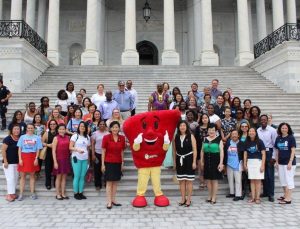How are your New Years’ Resolutions going? When you were making your resolutions, did you consider hepatitis B specific New Year’s resolutions? Here are a few ideas…
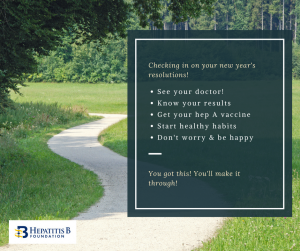
- Make an appointment to see your liver specialist. If you have hepatitis B, and you are not being seen regularly by a liver specialist, or a doctor knowledgeable about hepatitis B every six months, then make the commitment to do so this year. It is important to know and keep track of your HBV status and your liver health. Check out HBF’s Directory of Liver Specialists. We do not have names and contact information for all countries, so please feel free to share your favorite liver specialist with the HBV community. Make an appointment today!
- Organize your hepatitis B lab dataand make a table with the date of the blood draw and the associated blood test results. You’ll want to start by requesting copies of all of your labs from your doctor. Then you can generate data tables using Excel, Word or a pencil and paper table for your charted data. It will help you visualize your HBV over time, and you may find your doctor likes to see both the lab results and your table of results.
- Generate a list of questionsfor your next appointment with your liver specialist. People get nervous anticipating what their doctor might say about their health. It is very easy to forget those important questions, so be sure to write them down, or add them to a note app on your phone or tablet. If the option is available, have a family member or friend attend the appointment with you. That will allow you to pay closer attention while your friend or family member takes notes for you.
- Have you received a vaccine for hepatitis A? The HAV vaccine is recommended for children and adults living with HBV. The vaccine will protect you from another liver virus and additional stress to your liver. There is no vaccine available for HCV, HDV, or for HIV, so please take precautions to avoid coinfection with any of these infectious diseases. No one wants a coinfection. It’s complicated.
- Avoid the use of alcohol. Hepatitis B and alcohol is a dangerous combination. An annual toast to the New Year? Sure. Drinking daily, weekly or even monthly? Not a good idea. Binge drinking? Dangerous. A studyshows an increased risk for liver cancer among cirrhotic patients with HBV. Don’t let it get that far. If you have HBV and you are still drinking alcohol, seek the help you need to stop.
- Are you still smoking?Please stop. There are numerous reasons to stop, but remember that smoking is also an independent risk factor for liver cancer. Once again seek any help you may need to quit for good.
- Exercise. Many people think that having a chronic illness precludes them from exercise. This is rarely the case, but if you have concerns, talk to your doctor. If you consistently exercise, keep up the good work. If you don’t, please start slowly and work your way up to a more strenuous routine, and follow general physical activity guidelines for adults. Join a gym or find an exercise buddy. Don’t compare yourself to others and work at your own pace. Set realistic workout goals. You don’t need to run a marathon. Brisk, daily walking is great, too. You may find that you experience both physical and emotional benefits, and if you exercise with friends, you’ll also benefit socially. Clinical and experimental studiesshow that physical exercise helps prevent the progression of liver cancer and improves quality of life. It also helps prevent the development of non-alcoholic fatty liver disease (NAFLD or “fatty liver”. Get moving. It’s good for your overall health and specifically your liver!
- Maintain a healthy weight by eating a well-balanced diet.This is a favorite on the New Year’s Resolution list for just about everyone with or without HBV. You can’t prevent or cure HBV with a healthy diet, but it does help by preventing additional problems like the onset of fatty liver disease or diabetes. If you’ve been following trending health problems, then you are well aware that fatty liver disease and type 2 diabetes are huge problems both in the U.S. and around the globe. Fatty liver disease and type 2 diabetes can often be prevented with a healthy diet and regular exercise. Start by avoiding fast foods, and processed foods. Cut down on fatty foods and sweets. Sugar (fructose) is not your friend. Avoid sugary treats and drinks with sugar, including sodas and fruit juices. Reduce the amount of saturated fats, trans fats and hydrogenated fats in your diet. Saturated fats are found in deep-fried foods, red and fatty cuts of meats and dairy products. Trans and hydrogenated fats are found in processed foods. With fatty liver disease, fat accumulates in the liver and increases inflammation. If you have hepatitis B, you want to avoid any additional complications that may arise with fatty liver disease. Diabetes and HBV together can also be very complicated. So what should you eat? Eat plenty of fresh vegetables, fresh fruits, whole grains, fish and lean meats, and whole grains. Eat brown rice, whole wheat breads and pastas, instead of white rice, bread and pasta. Go back to the basics! If you have specific questions about your diet, be sure to talk to your doctor.
- Don’t worry, be happy… Easy to say, but not so easy to accomplish. Anxietyand depression associated with a chronic illness are challenging problems that may be short term, or can worm their way into nearly every aspect of your life. They can even create physical symptoms that may be confusing and may result in even more worry. Please talk to your doctor if you believe your anxiety or depression is something you are unable to manage on your own. Consider joining a support group where you can talk to others facing the same challenges. Personally, I found the Hepatitis B Information and Support List a wonderful source of information and support. Chronic illness can feel very lonely – especially with a disease like HBV that has a stigma associated with it. Find a trusted confident with whom you can share your story.
Check out our previous post about New Year’s resolutions to get more ideas and tips!






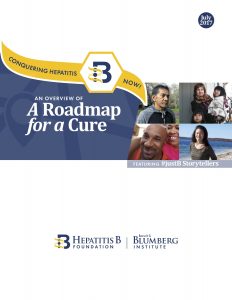 May was definitely a big month. Not only because we had numerous screening events and celebrations for Hepatitis Awareness Month, but also because we launched our Hep B Cure Campaign. The Hep B Cure Campaign is a national advocacy campaign to Double the Federal Funding within five years for hepatitis B and liver cancer research and public health. In March, we convened a virtual workshop with more than 30 of the world’s leading scientists to determine the research needed to find a cure for hepatitis B, and identify specific research projects in virology, immunology, and liver cancer, as well as strategies for expanding clinical research for therapeutic drug testing. The Hep B Cure Campaign is calling for increased federal investment to accelerate the pace of research for a cure, which will also significantly improve health and economic outcomes. Our full plan can be found in our “
May was definitely a big month. Not only because we had numerous screening events and celebrations for Hepatitis Awareness Month, but also because we launched our Hep B Cure Campaign. The Hep B Cure Campaign is a national advocacy campaign to Double the Federal Funding within five years for hepatitis B and liver cancer research and public health. In March, we convened a virtual workshop with more than 30 of the world’s leading scientists to determine the research needed to find a cure for hepatitis B, and identify specific research projects in virology, immunology, and liver cancer, as well as strategies for expanding clinical research for therapeutic drug testing. The Hep B Cure Campaign is calling for increased federal investment to accelerate the pace of research for a cure, which will also significantly improve health and economic outcomes. Our full plan can be found in our “ Just last week, it was announced that Hepatitis B Foundation’s president and co-founder, Dr. Timothy Block, was named a 2017 National Academy of Inventors Fellow! This is the highest professional accolade given to academic inventors who have demonstrated a prolific spirit of innovation in creating or facilitating outstanding inventions that have made a tangible impact on quality of life, economic development, and welfare of society. Congratulations Dr. Block!
Just last week, it was announced that Hepatitis B Foundation’s president and co-founder, Dr. Timothy Block, was named a 2017 National Academy of Inventors Fellow! This is the highest professional accolade given to academic inventors who have demonstrated a prolific spirit of innovation in creating or facilitating outstanding inventions that have made a tangible impact on quality of life, economic development, and welfare of society. Congratulations Dr. Block! 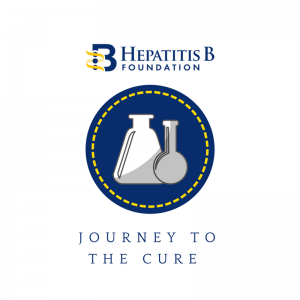





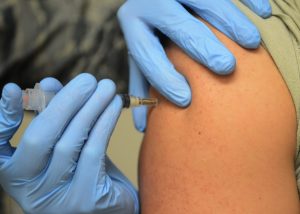 The
The 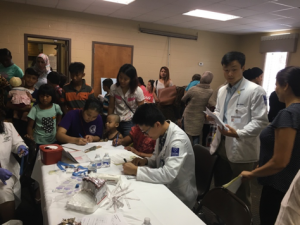

 How many years have you had hepatitis B? The longer you’re infected, the higher your risk of liver cancer.
How many years have you had hepatitis B? The longer you’re infected, the higher your risk of liver cancer.